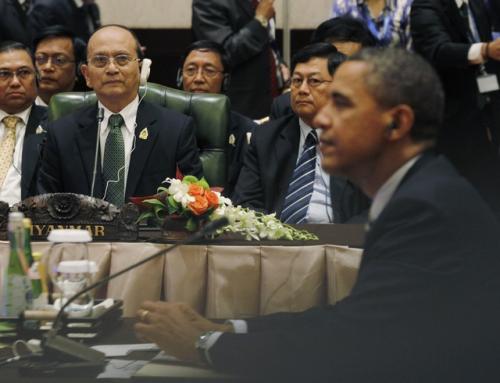Burma: New Doubts About Pace of Reforms
The United States should use the upcoming visit by Burma’s president to ask tough questions about the slowing pace of human rights reforms and insist on implementation of past commitments, Human Rights Watch said. President Barack Obama is hosting a visit to Washington, DC, by Burma’s president Thein Sein on May 20-21, 2013.

U.S. President Barack Obama sits alongside Myanmar's President Thein Sein in a US-Association of South East Asian Nations (ASEAN) meeting in Nusa Dua, Bali on November 18, 2011.
Six months after Obama’s visit to Burma, key pledges by the Burmese government remain unimplemented or unmet. With large numbers of political prisoners still not released, a May 17 release of about 19 political prisoners appeared to be more politically calculated than a genuine commitment to reform.
“The last year has seen devastating violence against minorities and a stalled reform process,” said John Sifton, Asia advocacy director. “President Obama should insist on steps to prevent further outbreaks of violence. He must also make it clear that there are consequences if the Burmese government fails to implement its previous human rights pledges.”
On November 18, 2012, just before Obama’s visit to Rangoon, Thein Sein issued a set of pledges on key reform issues, including promises to create a commission to review political prisoner cases, invite the United Nations High Commissioner for Human Rights to open offices in Burma, and “expedite its negotiations” with humanitarian organizations for access to conflict-affected areas.
Regarding violence against ethnic Rohingya and other Muslim communities in Burma’s western Arakan State, Thein Sein’s 2012 statement pledged the government would take “decisive action to prevent violent attacks against civilians,” hold perpetrators of abuses accountable, and “address contentious political dimensions, ranging from resettlement of displaced populations to granting of citizenship.”
Six months later, the Burmese government’s implementation of most of these pledges has faltered. No invitation has been issued to the United Nations High Commissioner for Human Rights, and negotiations for an agreement to set up an office have made no significant progress. Humanitarian aid organizations remain without full access to conflict areas in Kachin State, where a nearly two-year armed conflict between the Burmese army and Kachin rebels has displaced over 80,000 people, and in eastern Burma, where over 400,000 people are displaced from decades of civil war.
In February, the government formed a Political Prisoner Verification Committee comprising officials, members of Burmese civil society, and former prisoner groups, but the committee has only met three times.
The release of political prisoners on the eve of Thein Sein’s trip was done unilaterally by the president’s office – not through the committee. A political prisoner release in April was the result of a presidential amnesty, and the committee was not even informed in advance.
“Burma’s government still appears to be using political prisoner releases as a public relations tool, rather than to bring an end to politically motivated imprisonment,” Sifton said.
In Arakan State, over 140,000 Rohingya and other Muslims remain in closed displaced person camps, denied freedom of movement, without access to livelihoods, and lacking adequate shelter, humanitarian aid, and basic services. Anti-Muslim violence has continued, and there has been little accountability for local security forces implicated in crimes against humanity committed during a campaign of ethnic cleansing that began last year.
Obama and Thein Sein should acknowledge that persecution of minority Muslims threatens Burma’s reform process, and that the Burmese government should undertake diligent investigations of past violence and persecution. Thein Sein should also commit to major restructuring of border and police forces and an expedited plan for reintegration and reconciliation of displaced populations.
Human Rights Watch also called on Thein Sein to commit to amending Burma’s 1982 citizenship law to remove discriminatory provisions that effectively deny Rohingya and certain other ethnic groups the ability to obtain citizenship, even when their families have lived in Burma for generations.
Human Rights Watch urged Obama to comment publicly on the Burmese government’s lack of progress on the November pledges, and to press Thein Sein to ensure their implementation.
Both governments should acknowledge that the political reform process is incomplete, and that key milestones of progress will be free and fair parliamentary elections in 2015, along with necessary amendments to the constitution to remove the Burmese military’s constitutional authority over civilian government. This includes removing the military’s authority to appoint 25 percent of the seats in the parliament, and to dismiss the parliament and president.
“There are negative consequences for rights when diplomatic rewards continue even as reforms stall,” Sifton said. “If the US keeps delivering carrots on the same schedule while Burma breaks its promises, Burma’s leaders will conclude that they are no longer under serious international pressure to follow through on reforms.”
Obama and US officials should also make it clear that support for the Burmese military is contingent on Burma meeting strict criteria of human rights improvement, including accountability for past abuses, and constitutional reforms to fully restore civilian rule.
“The reform process in Burma will ultimately require the military coming under civilian rule and formally and legally stepping aside from politics,” Sifton said. “The reform process by necessity involves the military relinquishing its powers, and both presidents should acknowledge this.”
Source: Human Rights Watch
- 429 reads
Human Rights
Ringing FOWPAL’s Peace Bell for the World:Nobel Peace Prize Laureates’ Visions and Actions

Protecting the World’s Cultural Diversity for a Sustainable Future

The Peace Bell Resonates at the 27th Eurasian Economic Summit

Declaration of World Day of the Power of Hope Endorsed by People in 158 Nations

Puppet Show I International Friendship Day 2020

